

Course design for MOOCs. “Our team realized quickly that we needed to do a better job cross referencing material on our course site.
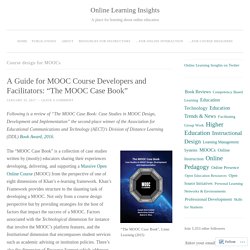
For example if we mention syllabus, we must link to it. Some students we have learned want a great deal of guidance” MOOC instructor, Karen Head (2013) Index. Bali_0314.pdf. Library of Economics and Liberty. 10 Must-Read Articles about MOOCs. 19inShare Pretty much everyone in the world of eLearning is familiar with the rise of MOOCs, or Massive Open Online Courses.
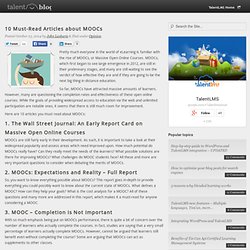
MOOCs, which first began to see large emergence in 2012, are still in their preliminary stages, and many are still waiting to see the verdict of how effective they are and if they are going to be the next big thing in distance education. So far, MOOCs have attracted massive amounts of learners. However, many are questioning the completion rates and effectiveness of these open online courses. While the goals of providing widespread access to education via the web and unlimited participation are notable ones, it seems that there is still much room for improvement. Esp4.png (PNG Image, 517 × 582 pixels) Teaching Online? Keep These Best Practices in Mind · BrigitteCScott.
Why Tech Still Hasn't Solved Education's Problems. Sloan-C eLearning Landscape. At a recent conference, David Wiley, open education pioneer said that MOOCs (massive open online courses) were essentially 1999 online learning with the password protection taken away.
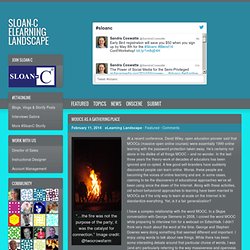
He’s certainly not alone in his dislike of all things MOOC – and no wonder. In the last three years the theory-work of decades of educators has been ignored and co-opted. A few good self-branders have suddenly discovered people can learn online. Worse, these people are becoming the voices of online learning and are, in some cases, claiming to be the discoverers of educational approaches we’ve all been using since the dawn of the Internet. Along with these activities, old school behaviorist approaches to learning have been married to MOOCs as if the only way to learn at-scale on the Internet is to standardize everything.
I have a complex relationship with the word MOOC. Ethical reflections on MOOC-making (Rebecca Kukla) UPDATE: Signed comments preferred.
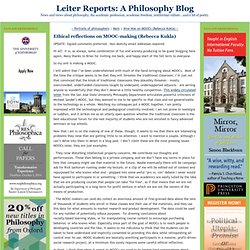
Non-sketchy email addresses required. Hi all! Mooc.org. The Different Levels of Boredom in eLearning Content. The Different Levels of Boredom in eLearning Content Boring eLearning is a huge problem for learners and instructors alike.
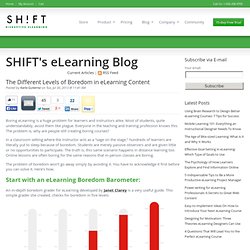
Most of students, quite understandably, avoid them like plague. Everyone in the teaching and training profession knows this. The problem is, why are people still creating boring courses? In a classroom setting where the instructor acts as a “sage on the stage,” hundreds of learners are literally put to sleep because of boredom.
The problem of boredom won’t go away simply by avoiding it. Start with an eLearning Boredom Barometer: To Benefit From Technology, We Need to Understand Psychology. A paradox of selling technology in the 21st century is that it’s often more difficult to convince users that they need the latest gadget, even if that gadget is more advanced.

The original iPhone was a marvel, but despite lavish improvements, each rendition somehow seems less impressive. It makes sense, then, that according to a recent Wall Street Journal article by Spencer E. Ante, “about 68 million people upgraded their phones in the U.S. [last year], down more than 9% from a year earlier.” One reason is nearly 70% of contract subscribers own smartphones, so there are simply fewer people looking to upgrade to Internet-ready devices. But the second and deeper component is that smartphone users no longer see the benefit of purchasing the latest iPhone or Galaxy.
Why today is my last day teaching online… I just submitted final grades for the last time.
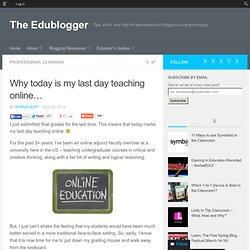
This means that today marks my last day teaching online. For the past 3+ years, I’ve been an online adjunct faculty member at a university here in the US – teaching undergraduate courses in critical and creative thinking, along with a fair bit of writing and logical reasoning. The Professors’ Big Stage. A Tale of Two MOOCs @ Coursera: Divided by Pedagogy. The Web as a classroom is transforming how people learn, is driving the need for new pedagogy; two recently launched courses at Coursera highlight what happens when pedagogical methods fail to adapt.
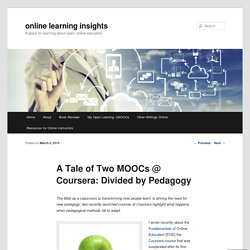
Divided pedagogy I wrote recently about the Fundamentals of Online: Education [FOE] the Coursera course that was suspended after its first week and is now in MOOC hibernation mode. Peter Norvig: The 100,000-student classroom. How In-Person Meetups Are Fixing The Problem With MOOCs. By Paul Glader, Managing Editor of WiredAcademic BERLIN – Somewhere between the cookie cutter Prussian-style classroom model of education and the lone-ranger online learning idea lurks the blended learning ideal, where one can have concentrated individualized learning time balanced with work among a small community of like-minded learners. Plato and others had this figured out thousands of years ago. It’s coming back. A few weeks ago, I signed up for a Coursera class – a massive open online course, or MOOC – a month ago and signed on to watch my first lecture this past week.